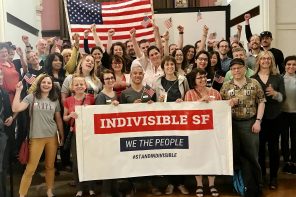When New York Times foodie Mark Bittman signed onto the fast organized by Sojourners’ Jim Wallis and Bread for the World’s David Beckmann in protest of the draconian proposed Republican budget cuts last week, he probably elevated the profile of the effort beyond its usual base of support. Indeed, blogging at the Nation, progressive radio host and journalist (and, I’m guessing from her Twitter feed, atheist) Allison Kilkenny highlighted the efforts of Bittman, Wallis, and Beckmann, as well as the notoriously pious Tony Hall, the former Democratic Congressman.
Hall is a protégé of the Family whose politics “moved rightward” under the tutelage of the Family, according Jeff Sharlet (whose book also details the Family’s storied history of union-busting in the service of biblical capitalism). As Sharlet told me in a 2008 interview, the Family’s founder, Abraham Vereide, was opposed to the social gospel, believed that unions were a form of disobedience against God, and had a vision at the height of the Great Depression: “God doesn’t want to have soup kitchens or social welfare programs, God doesn’t like what FDR is doing.”
Bittman, for his part, doubts that “God will intervene” but believes “we need to gather and insist that our collective resources be used for our collective welfare, not for the wealthiest thousand or even million Americans but for a vast majority of us in the United States and, indeed, for citizens of the world who have difficulty making ends meet. Or feeding their kids.” Amen to that, no doubt. But the whole fasting effort—no matter how inspirational, either religiously or secularly, it is to many people—demonstrates the tepid, pointless, and often counterproductive marriage of convenience the Democrats have made with a certain kind of religion.
Wallis, for his part, loves to describe President Obama as his “friend.” His 2006 Sojourners event, at which Obama gave an enthusiastically received speech, was seen as a turning point in a surge of young evangelical support for his candidacy. Wallis is frequently cited as one of President Obama’s “spiritual advisors,” and was one of the early promoters of, and advisors to, Obama’s Office of Faith-Based and Neighborhood Partnerships. But on this issue, Wallis seems to have lost—if he ever actually had—his influence.
As E.J. Dionne (also a fan of government partnerships with faith-based groups) wondered in the Washington Post yesterday, in reacting to Rep. Paul Ryan’s budget proposal:
Will President Obama welcome the responsibility of engaging the country in this big argument, or will he shrink from it? Will his political advisers remain robotically obsessed with poll results about the 2012 election, or will they embrace Obama’s historic obligation — and opportunity — to win the most important struggle over the role of government since the New Deal?
That the question is even a question shows just how toothless the Democratic-religious alliance is (and, indeed, Obama’s alliance with other elements of his non-corporate base, to boot, but that’s another story). After all, the Democrats are the ones who reject hard-hearted conservative theocracy and embrace—Glenn Beck be damned—social justice religion, right? That a prominent liberal Washington insider and social justice-minded Catholic like Dionne has already essentially conceded that there’s little doubt the president will cave to political expediency rather than defend the Democratic-religious alliance demonstrates just how fragile—or shall I say phony? or non-existent?—it really is.
I’ve always doubted that religious support for Obama turned the 2008 election; as I’ve argued before, he gained support across the a number of demographic groups, and it’s difficult to make the case that Obama won because he finally shed the Democrats’ (imagined) hostility to religion. If you’re a religious person whose faith compels you to favor government programs to support the less economically blessed among us, pulling the lever for McCain-Palin probably wasn’t in the cards.
To add insult to injury to the “religion industrial complex,” as Digby calls it, the services of the small number of political strategists who peddled the Democrats-need-to-talk-more-about-religion theory are apparently no longer wanted by the Democratic Party. Never mind whether Democrats finally got good at “talking about their religion,” as if that were the only measure of whether a religious person would want to vote for them. Religious people think about policy, too, and suggesting that they prefer some God talk to a Democratic Party with the backbone to stand up to Paul Ryan is, I would imagine, more than a bit insulting.
But let’s not delude ourselves into lamenting the administration’s apparent diss of Jim Wallis. After all, liberal religious activists have long bristled at the Democrats’ embrace of certain religious figures who are “safe” because they’re not too subversive for conservatives—especially on issues of sexuality, but also on the role of religion in government and other issues. The big fail here is not that Democrats have abandoned religion, or their favored religious activists, but that they have abandoned their fellow Americans.


